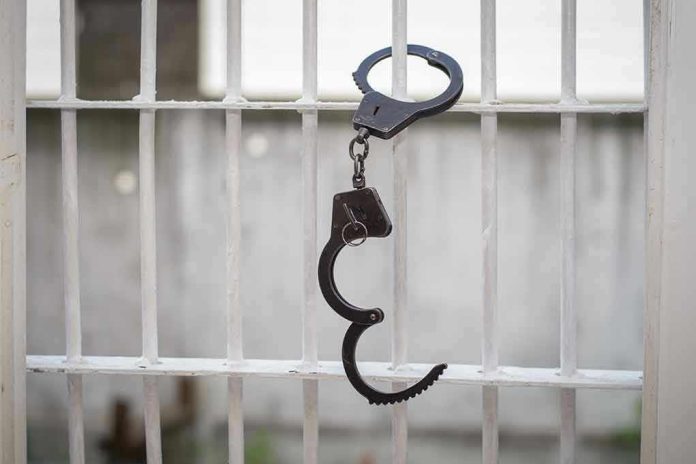
A once-celebrated rapper, Ca$h Out, now finds himself facing the harsh reality of life behind bars, a fall from grace few could have predicted.
At a Glance
- Ca$h Out, once a rising star, sentenced to two life terms plus 70 years.
- His mother and cousin also received lengthy sentences for their roles in the sex trafficking ring.
- The case utilized Georgia’s RICO statute, setting a precedent for future prosecutions.
- Victims were coerced using the rapper’s fame and influence, leading to their exploitation.
Ca$h Out’s Downfall: From Fame to Infamy
John Michael Hakim Gibson, better known as Ca$h Out, captivated the music world with his 2011 hit “Cashin’ Out,” achieving platinum status and collaborating with top artists. However, beneath the glittering facade of fame lay a sinister enterprise orchestrated by Gibson and his co-conspirators. This criminal enterprise, active from 2017 to 2024, exploited Gibson’s celebrity and social media influence to recruit and coerce women into prostitution, using the pretense of his record label, Pyrez Music Group LLC, as a front.
The culmination of years of investigation led to a 46-count RICO indictment in June 2023, revealing the depth of their criminal activities. Prosecutors presented a mountain of evidence, including jail calls, cellphone records, and surveillance footage, which painted a grim picture of exploitation and manipulation. As the trial unfolded in Fulton County, Georgia—a jurisdiction noted for its tough stance on RICO and trafficking cases—the gravity of the charges became impossible to ignore.
Sentencing and Repercussions
Gibson’s sentencing on July 21, 2025, echoed through the music industry and beyond. The court handed him two life sentences plus 70 years for crimes including rape, aggravated sodomy, and sex trafficking. His mother, Linda Smith, known as “Mama Ca$h,” received a 30-year sentence, while his cousin, Tyrone Taylor, was sentenced to two life terms plus 93 years. The sentences reflect the heinous nature of their crimes, described by Judge Melynee Leftridge as “diabolical,” a sentiment echoed by prosecutors who emphasized the calculated use of Gibson’s celebrity to lure and exploit victims.
Despite the damning evidence, Gibson maintained his innocence at sentencing, labeling the jury’s verdict a “wrong judgment” and alleging witness coercion. Yet, the jurors, who deliberated meticulously over seven weeks, found the evidence compelling and overwhelming, leading to a unanimous guilty verdict.
Legal and Social Implications
The case sets a new precedent for the application of Georgia’s RICO statute, showcasing its potential as a powerful tool in the fight against sex trafficking. By targeting high-profile figures like Gibson, law enforcement sends a clear message: no one is above the law, regardless of their celebrity status. This landmark case may well encourage further investigations into similar exploitative enterprises masquerading as legitimate businesses within the entertainment industry.
The fallout from this case extends beyond legal ramifications. It shines a spotlight on the darker side of celebrity culture, where influence can be wielded for nefarious purposes. The music industry, particularly Atlanta’s vibrant hip-hop scene, faces heightened scrutiny as it grapples with reputational challenges and the potential for increased law enforcement attention.
Broader Impacts and Future Outlook
The immediate impact is the incarceration of all principal defendants and a semblance of closure for the victims who bravely testified. However, the long-term implications are yet to unfold fully. The case could spur legislative changes aimed at strengthening anti-trafficking measures and enforcing stricter oversight within the entertainment sector. Moreover, it may prompt record labels and management companies to reassess their oversight protocols, ensuring that artists’ conduct aligns with ethical and legal standards.
As the dust settles, this case serves as a stark reminder of the pervasive risks within the entertainment world and the urgent need for vigilance and accountability. It also underscores the power of the law to hold even the most influential figures accountable for their actions, reaffirming the principles of justice and the rule of law.




